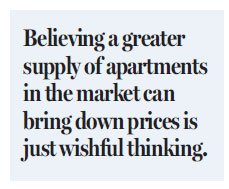More govt intervention in housing justifiable
Updated: 2017-09-18 07:22
(HK Edition)
|
|||||||||
Based on what Chief Executive Carrie Lam Cheng Yuet-ngor and other top government officials have said in the past several weeks, it has become clear that increased government intervention, especially in housing, is the new norm.
Such a change in economic policy should not have come as a surprise to anyone who has been following the news. Lam and others have repeatedly said a more expansive budget policy, short of deficit financing, is needed to tackle the economic and social challenges that trouble Hong Kong.
In the past, the government was seen to be obsessed with controlling the increase in recurrent expenditure because of Hong Kong's narrow tax base and, more importantly, the aversion to debt financing. For that reason, it was a practice for the government to hand out part of the annual surplus in the form of tax rebates and other one-off incentives.

Some economists and business leaders have called on the government to spend down the fiscal reserve which, at about HK$800 billion, or 24 months of government expenditure, is seen as wastefully high. The question is where and how to spend the public funds?
The answer to that question seems obvious: housing. Previously, the government believed the problem arising from escalating home prices could be solved by increasing the supply of land for developers to build more apartments. That way, the government could make money by selling land while increasing the housing supply.
But the market doesn't work that way. One thing developers fear most is a supply glut, tying up precious capital. Their priority is to control the supply of finished apartments at levels below demand to ensure rising prices. They were helped tremendously by the persistent low borrowing costs and inflow of overseas capital into the property market.
The government has exceeded its land-creation target, but home prices have continued to surge, giving rise to growing public discontent. This has led the government to come to the obvious conclusion that the housing problem can only be solved by a massive public-housing program which can be extremely costly and time-consuming.
There are stopgap measures worth considering. For instance, the government has proposed a plan to increase the supply of better-quality subdivided flats in old apartments in cooperation with non-profit organizations for rental to needy families. The other idea is to allow conversion of old factory buildings into apartments as long as they abide by the established safety and health standards.
These are sound proposals that can bring almost immediate benefits to the many families who cannot afford the price or rental of a decent place to live. But these practical solutions to an immediate problem have drawn criticism from opposition politicians and social radicals although they don't have any alternative plans that can work.
Lam recently made it known that the government has plans to work with private developers to build public housing estates on part of the rural land they own in the New Territories. This is not a new idea. Similar projects in other parts of Hong Kong have shown the arrangement can work to the benefit of both the public and developers.
It makes no sense to be bogged down in arguments about who is going to have a better deal in such cooperation efforts. It is hard to place a monetary value on the social benefits the government can obtain from such arrangements.
In fact, the government has finally got it right by drawing a distinction between the property market and public housing. Believing a greater supply of apartments in the market can bring down prices is just wishful thinking. Past attempts to dampen market prices of properties with administrative and monetary measures have proved futile. The Singapore government realized that long ago.
Other cities, such as Shenzhen, have the option to annex neighboring regions when development space runs out. Hong Kong does not. One of the least costly and disruptive ways to create land for public housing is to reclaim land from the sea. The other is to redevelop some existing public housing estates to increase floor space.
Both these options are under consideration. Money shouldn't be a problem now that the government has summoned the will to spend. But it would still need wide public support for the various projects touching on a host of political and environmental issues.
But most Hong Kong people would agree, it's worth the money and effort to tackle the housing shortage problem that is creating much hardship for many thousands of low-income families.
The author is a veteran current affairs commentator.
(HK Edition 09/18/2017 page8)